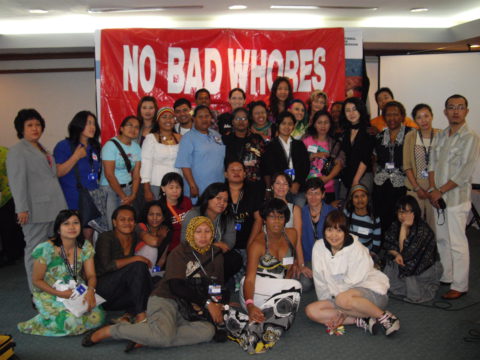
People outside the sex worker community take up much of the mainstream air space when it comes to sex worker issues. As such, sex worker human rights cannot be discussed without first discussing whose voices matter.
Sex workers are the experts. This article argues that there is a need to unpack whorephobia and listen to sex workers in order to really challenge the laws that discriminate against us. On Tuesday 11 November 4.30-6pm at Catani Gardens, St Kilda, sex workers and supporters will be gathering to hear local sex workers speak about their experiences of the unjust laws in Victoria.
More than a year after the brutal and unsolved murder of St Kilda sex worker Tracey Connelly, the voices of sex workers demanding law reform are just as consistently and conspicuously overlooked in the mainstream as they were before her passing. How is this so?
Identity is central to these discussions. Why do people who are not sex workers position themselves as experts on sex worker issues? Why are sex worker voices marginalised and questioned the moment we speak up? These questions are very real for the sex worker community.
Earlier this year, the Festival of Dangerous Ideas (FODI) hosted a panel to discuss sex work, but without inviting a sex worker.
Weeks of emails and negotiations fell flat and Scarlet Alliance was not given a spot on the stage. During the event, however, panelist Elizabeth Pisani handed her seat to Jules Kim, from Scarlet Alliance, who represented sex worker issues proficiently.
But the question still exists: what is it about sex worker issues that makes people believe it is okay to talk about us, without us?
Peta Brady’s one-person show “Ugly Mugs” takes this a step further. The play appropriates sex worker stories that were shared through a sex worker-only confidential resource. The “Ugly Mugs” resource was created originally by sex workers for the purpose of sharing safety information within our community.
Brady uses the “Ugly Mugs” pamphlet disrespectfully as “pity porn” for theatre-goers entertainment.
What is distressing in this example is that when sex workers stood up and questioned the ethics, agenda and portrayal of sex workers in the play, those objections were not listened to. We were not taken seriously. The play went on. The stories are still for sale. Even with protests, emails, meetings, letters and op-eds raging for months, none of the key players have actually acted upon sex worker concerns.
It is as if we are talking into a vacuum!
Whorephobia
The idea that we as sex workers are unable to speak up for ourselves, or that we require help and representation from outside our own community, or that if we speak we must somehow not have a right to represent ourselves, are whorephobic.
Sex worker organisations, run for and by sex workers, have been speaking up formally in Australia for three decades. The first funded sex worker organisation in the world was in Sydney, founded by trans sex worker Roberta Perkins in the 1980s. During the beginnings of the HIV epidemic, sex workers in all major Australian cities organised into formal collectives to better organise HIV prevention efforts.
Sex worker organisations have been phenomenally successful in keeping HIV and sexually transmissible infection rates low among the sex worker community in Australia and in doing so, have attracted international attention.
This year The Lancet released a special edition to look at the contributing factors that prevent HIV among sex workers, and it was found that decriminalisation of sex work and the existence of strong local sex worker leadership and peer education is vital to HIV and STI prevention.
The Lancet found that the decriminalisation of sex work reduces HIV prevalence among sex workers by 33-46 per cent.
Sex workers have been campaigning for decriminalisation for three decades. At a pre-conference to Melbourne AIDS 2014 sex workers again demanded decriminalisation, a message supported by many of our allies including World Health Organisation, United Nations Population Fund, UNAIDS, NSWP and the National Association of People Living with HIV in Australia.
Another five topics were also covered in a consensus statement: biomedical developments, stigma and discrimination, human rights, migration and mobility, and funding.

Sex Worker Pre-Conference Meeting, International Congress on AIDS in Asia and the Pacific, Bali, 2009.
“Our work is not a tragedy tale, Pretty Woman tale, or happy hooker tale. It’s a job.”
Identity
This is where identity issues become the crux of dialogues about sex worker human rights.
For us, our work is not a tragedy tale, Pretty Woman tale, or happy hooker tale. It’s a job. Maybe it’s some of these stories some of the time; maybe it’s a whole bunch of other stories. Maybe it’s very exciting, maybe it’s very boring. Probably it’s both, depending on the day of the week.
As sex workers, our lives are as complex and multi-dimensional as any other person’s. But when interacting with the world at large, we are expected to have stories that fit stereotypes, stereotypes that are perpetuated by the world at large.
Victim or empowered. Trafficking victim or pimp. Rolling in money or eating from bins. Love our clients or hate them.
These stereotypes don’t give us much room to move, and they contribute to sex workers disengaging from public life or making informed choices to stay in the closet.
It is possible that there are sex workers in your own social circles. If you are a lucky person your friends or family who are sex workers will have disclosed this to you. One of the reasons sex workers choose not to disclose their work to the people close to us is because we don’t want to be used as cultural cache.
We don’t want to become someone else’s story.
There are three great online films that are for allies, partners and family members of sex workers. They aim to help partners and family members understand – rather than belittle or tokenise – the people in their lives who are sex workers.
This is really important for everyone who is not a sex worker and I would urge all readers to check the films out and share them on social media. They are really great resources made by sex workers in Australia.
This article argues that there is a need to unpack whorephobia on a personal level. Sex worker voices do matter more than others. People who are not sex workers can assist from the back seat.
Sex workers are leaders, in our own lives and in the broader community. To accept this last point also means to accept sex work as work. It also means to understand that it is not okay to appropriate sex worker stories or to perpetuate stereotypes.
Without this understanding there can be no meaningful discussion about the human rights of sex workers. Hoping to see you at Catani Gardens St Kilda between 4.30 and 6pm on Tuesday 11 November. Come and hear the voices of sex workers!
—
Elena Jeffreys is a sex worker and representative of Scarlet Alliance, the Australian Sex Workers Association. Scarlet Alliance recognises Australia as a colony built upon Aboriginal land, pays respect to traditional elders and stands in solidarity with the struggles of Aboriginal and Torres Strait Islander people.

